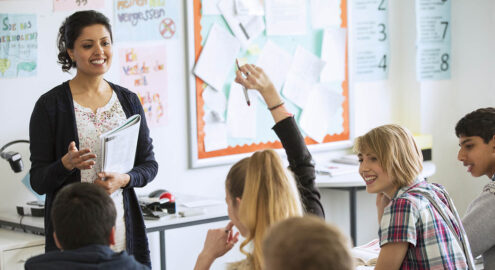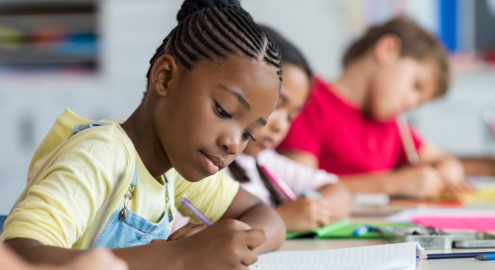What Are They?
According to the Collaborative for Academic, Social, and Emotional, Learning (CASEL), social-emotional learning (SEL) is “the process through which children and adults understand and manage emotions, set and achieve positive goals, feel and show empathy for others, establish and maintain positive relationships, and make responsible decisions.”
Social awareness and relationship skills are two of the five components that make up CASEL’s model of SEL.
Social awareness involves the ability to understand and empathize with others, particularly with people from different backgrounds than one’s own.
A white teacher whose students are from a different cultural background than her own makes an effort to get to know students’ families and communities and their unique strengths. Recognizing that she is always in learner-mode, she practices cultural humility by questioning her assumptions about social and ethical norms, beliefs, and expectations.
Skills that develop social awareness include:
- Showing understanding and empathy for others
- Identifying social cues (verbal, physical) to determine how others feel
- Predicting and understanding others’ feelings and reactions
- Practicing empathy, including perspective taking
- Recognizing individual and group strengths and differences
- Using reflective listening to understand and demonstrate respect for others
- Recognizing and using family, school, and community resources
- Demonstrating cultural humility
- Awareness of inequities and privileges that affect individuals and groups
“Relationship skills” is the ability to build positive relationships, especially with diverse individuals and groups, using a variety of methods such as active listening, and communication and conflict resolution skills. These skills also include the ability to resist pressure and to seek out and offer help.
A middle school principal, knowing that a harmonious work environment will ultimately benefit the students who are closely watching how the staff interacts with each other, strives to build a supportive school culture. At staff meetings, she brings in practices that cultivate trusting relationships such as gratitude, conflict resolution, forgiveness, and play.
Relationship skills include:
- Cultivating connection and friendship
- Developing positive relationships with diverse individuals and groups
- Practicing listening and communication skills
- Working cooperatively
- Resolving conflicts
- Offering and seeking help
- Applying appropriate uses of humor
- Approaching relationships with positive presuppositions
- Managing and expressing emotions in relationships, respecting diverse viewpoints
- Resisting inappropriate social pressures
Ultimately, social awareness and relationship skills are closely linked. For example, resolving a conflict with a colleague (relationship skills) is made easier when both parties can empathize with each other (social awareness).
Why Are They Important?
Teaching and school leadership are demanding jobs, to say the least. Yet research shows that cultivating social and emotional skills can help lessen burnout and turnover and increase job satisfaction in both teachers and principals. In addition, these skills can also help improve relationships with students, leading to higher academic achievement.
More specifically, studies have found that school staff members with social awareness and relationship skills can have tremendous impact on schools and students. For example:
Cultivating trusting relationships among staff is crucial to school reform.
- In their seminal 2002 study on the reform efforts of twelve Chicago public schools, Anthony Bryk and Barbara Schneider found that enabling positive social relationships between the adults was the key to successful school improvement—and that trust was at the heart of those relationships.
A teacher’s social awareness and relationship skills make a difference to students for years to come.
- Research has found that Kindergarten teachers’ perceptions of their relationships with students affect the behavioral and academic outcomes of students in subsequent grades—sometimes as far into the future as eighth grade.
- Studies show that if a teacher holds a negative view of their relationship with a student, that student is less likely to succeed academically and to show prosocial (kind, helpful) behavior in later years.
Teachers’ relationship skills influence student relationships.
- Students are more likely to see their peers who have supportive relationships with teachers as likable.
- Teachers who are knowledgeable of which peer groups students are a part of help to create a school environment where students feel they belong and are safe from bullying.
Training teachers in social skills makes a positive difference.
- Educators who receive professional development in how to create a caring classroom environment tend to increase their emphasis on prosocial (kind, helpful) values and to encourage cooperation more often in their classrooms. As a result, students are more engaged and show improved social skills, both of which lead to greater enjoyment of learning.
An “empathic mindset” in teachers can decrease student suspensions.
- One study found that when teachers who were trained to make the effort to understand and value misbehaving students’ experiences and challenging emotions, school suspensions were reduced by half.
A strong collaborative community is the foundation of a healthy school environment.
- A positive school climate is associated with lower absenteeism and school violence, and increased school connectedness, student motivation to learn, academic achievement, and teacher retention.
Practices

Building Collaborative Classroom Norms

Dialogue Journals for Middle School Students

Do you want to dive deeper into the science behind our GGIE practices? Enroll in one of our online courses for educators!


